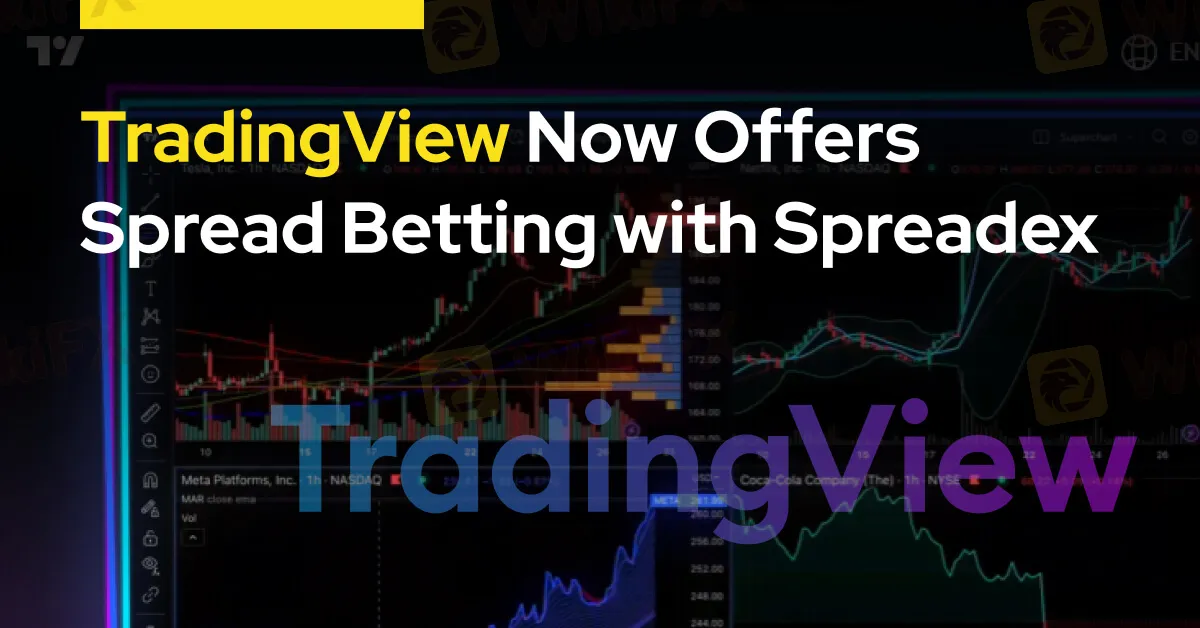简体中文
繁體中文
English
Pусский
日本語
ภาษาไทย
Tiếng Việt
Bahasa Indonesia
Español
हिन्दी
Filippiiniläinen
Français
Deutsch
Português
Türkçe
한국어
العربية
TradingView Now Offers Spread Betting with Spreadex
Abstract:TradingView, a social trading and charting platform, recently expanded its collaboration with UK-based brokerage Spreadex to incorporate spread betting functionality, as announced on Tuesday.

TradingView, a social trading and charting platform, recently expanded its collaboration with UK-based brokerage Spreadex to incorporate spread betting functionality, as announced on Tuesday.
With this integration, TradingView users can now seamlessly access spread betting features directly from TradingView's charting interface while logged into their Spreadex brokerage accounts.

TradingView, with a vast user base exceeding 30 million globally, integrates with various data feeds to grant users access to over 1.3 million financial instruments worldwide. The company has experienced robust growth in recent years as retail traders increasingly turn to social trading platforms.
Spreadex, established since 1999, is a reputable provider of contracts for difference (CFDs) and spread betting services. Spreadex joins a growing roster of brokers collaborating with TradingView to offer trading capabilities directly through the platform's advanced charting interface. Noteworthy partners include FxPro, Oanda, and AMP Global.
To utilize spread betting through TradingView, users need to log into their Spreadex brokerage account via the trading panel and look for symbols prefixed with “SPREADEXSB:” in the platform's symbol search function. This enhancement adds to Spreadex's existing range of tradable instruments on TradingView, encompassing index CFDs, stock CFDs, and currency pairs.

Spread betting and trading CFDs both involve speculating on the price movements of various assets without owning the underlying asset. However, there are key differences between the two. In spread betting, investors bet on whether the price of an asset will rise or fall within a certain time frame, with profits or losses determined by the accuracy of the bet and the size of the market movement. Spread betting allows investors to profit from both rising and falling markets and is often exempt from certain taxes, such as stamp duty and capital gains tax. On the other hand, trading CFDs involves buying or selling contracts based on the price movements of assets, with investors entering into contracts with a broker to exchange the difference in the value of the underlying asset between the time the contract is opened and when it is closed. While both spread betting and trading CFDs offer opportunities to profit from market movements, they differ in their mechanics and tax implications.

Disclaimer:
The views in this article only represent the author's personal views, and do not constitute investment advice on this platform. This platform does not guarantee the accuracy, completeness and timeliness of the information in the article, and will not be liable for any loss caused by the use of or reliance on the information in the article.
Read more

Revealing The Latest Forex Scams in FXRoad
Have you been lured into forex investment through FXRoad under the fake impression of professionally managed services? However, in real time, this broker denied withdrawals? You have unfortunately trusted a scam broker. Read some hard reviews of the broker.

WeTrade Review: Why Traders Are Choosing WeTrade in 2025?
With so many trading platforms available today, traders have every reason to be careful—and staying scam alert is more important than ever. However, WeTrade has managed to earn a positive reputation for the right reasons. Know the Reasons right away

Interactive Brokers Expands Forecast Contracts to Europe
Interactive Brokers expands its event-based Forecast Contracts to Europe. Learn how to trade these contracts on the IBKR ForecastTrader platform with global access.

Is Forex Trading Halal or Haram? What Do Scholars Say?
For Islamic traders and investors, one of the most relevant and frequently asked questions is whether forex trading is halal (permissible) or haram (forbidden) in Islam? In this article, we will explore both sides of the debate. Keep reading to uncover the truth and make Informed & Faith-conscious decisions about your investments.
WikiFX Broker
Latest News
PayPal reports slow growth in key margin figure even as earnings top estimates
5 Best Forex Brokers in Singapore for 2025
Trump's tariffs could soon bring higher food prices for some Americans, analysis finds
iFourX: So Many Red Flags You Can’t Ignore
Tom Lee's Granny Shots ETF rakes in $2 billion in AUM just 9 months after inception
Starbucks same-store sales fall again, but CEO Niccol says turnaround is ahead of schedule
Singapore holds monetary policy, flags slowdown in second half of the year
Top Forex Chart Patterns Every Trader Must Know
Adidas to raise prices as US tariffs cost €200m
Top 4 Forex Scam Tactics Fake Brokers Use to Trap Investors
Currency Calculator


